#this is a heteronormative post for the sake of my point but i do regret having to say ive gotten the ick from women too...
Text
parasocial relationships are so fucking important cause imagine you feel horny one day but your local options are like steve jake and robby and none of them own razors ?? of course youd rather go on your computer and make heart eyes at the perennially single millionaire with the skincare routine
6 notes
·
View notes
Note
Could you please write your essay on the zutara, kataang and maiko analysis? I would like to hear what you have to say...
Yes! Okay so I recently reblogged this post about Yin and Yang and how Zutara does not represent it, but Mai/ko and Kat/aang do. As I said in my tags, as a zutara shipper I do have a lot of thoughts on the interpretations of these three ships written in this post.
The interesting thing about this anti zutara analysis and the reason I reblogged it is that I almost completely agree with everything said about zutara.
In the original post, OP goes on describe the two most popular ways that people associate yin and yang with zutara and refute them:
I have seen two flavors of the yin and yang argument for Zutara. The first is the somewhat grounded point that Katara is a female waterbender and represents yin, while Zuko a male firebender and represents yang. The second is the completely clueless assertion that Zuko is “dark” and therefore yin and Katara “light.” therefore yang.
I could not agree more. So many anti zutara shippers (and even a lot of casual zutara shippers) like to picture zutara as the good girl/bad boy ship and I really hate that because the ship is so much more complex than that. Katara is not a goody two shoes pure angel, and Zuko is not an evil badboy who needs Katara to redeem him.
The first of these arguments, of female, water-associated, yin Katara and male, fire-associated, yang Zuko is true as it goes according to the traditional concepts of yin-yang, but it’s incomplete, outdated, and even dehumanizing in my opinion. It’s basically saying two people are right for each other based on what they are, characteristics that were inborn or cannot be changed, instead of who they are, their personality and individuality. Their actual personalities tell a very different story, as I will discuss below…
…Also frankly, the parts about masculine yang and feminine yin are the products of heavily sexist societies from two millennia ago. They reflect archaic gender roles where men are expected to be aggressive and assertive and women to be submissive and supportive….
…That’s why I don’t like the “female waterbender and male firebender are yin and yang = instant romance!” formulation. It’s sexist and heteronormative, and literalizes what were meant to be symbolic representations…
…If you’re actually interested in applying philosophical yin-yang to individuals and their relationships, it may help to think of yang as “drama” and yin as “chill.” Yang is starting things, getting in people’s faces, wearing your heart on your sleeve, raised voices. Yin is resolving things, calming down, contemplation, quiet conversation or just silent contentment. Everyone has some drama and some chill, but some people have more of one or the other. If one person in a relationship brings tons of drama, it strikes a good balance if the other can bring the chill. In this understanding of yin and yang, it should be clear Zuko and Katara are both drama llamas, that is yang ascendant. “But female waterben-” shush. Katara is more than her gender and element. Also the gender and element are symbolic representations of yin anyway, not the actual thing.
Based on what OP has written (I recommend reading the original post, even though the quote above is very long, I cut a lot of good stuff out for length) I completely agree that Katara and Zuko are both Yang. Up to this point in the essay, I 100% agree with everything written about Zutara.
Here is where I start to disagree…
Zuko and Katara, then, don’t personify the yin-yang balance at all. They both have too much fire, too much drama, and that’s why their interactions can spin out of control and bring out the worst in both. Remember “The Southern Raiders?” Where Katara set out to murder a war criminal and Zuko egged her on? It was Aang’s calming words, his chill, his yin that ultimately moderated her rage and helped her remember her better self. Aang is the yin to Katara’s yang.
Countless essays and analysis’ have been written about how ‘The Southern Raiders’ does not, in fact, bring out the worst in both Zuko and Katara, and so I’m not going to directly respond to the above statement. I will respond to the statement about Aang and Katara, however.
If you take Katara and Aang’s individual personalities, traits, and mindsets, I absolutely agree that Kat/aang could be a wonderful representation of Yin and Yang. Aang’s role as Avatar is to be a mediator and to bring peace. Keeping in mind Katara’s fiery personality and emotional drive, I think that the two could have had a really amazing balance if written well. The issue, however, is that we don’t see this at all, which can all be boiled down to the fact that Aang doesn’t understand Katara. Let’s look at the scene between Aang and Katara in ‘The Southern Raiders’:
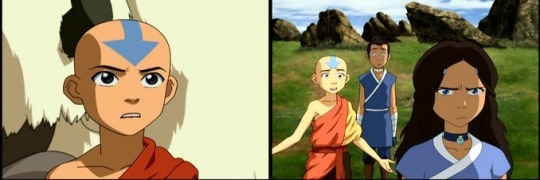
Aang: Umm… and what exactly do you think this would accomplish? Katara: (sighs and shakes her head) I knew you wouldn’t understand. (She begins to walk away)Aang: (Cut to a close up of Katara as Aang and Sokka look on behind her) Wait, stop, I do understand. You’re feeling unbelievable pain and rage. How do you think I felt about the sandbenders when they stole Appa? How do you think I felt about the Fire Nation when I found out what happened to my people?Zuko: (off screen) She needs this, (everyone turn their eyes towards him) Aang. This is about getting closure and justice. Aang: I don’t think so. I think it’s about getting revenge. Katara: (off screen) Fine! (Cut to an angry and frustrated Katara) Maybe it is. Maybe that’s what I need. Maybe that’s what he deserves. Aang: Katara, you sound like Jet. Katara: (defensively) It’s not the same. Jet attacked the innocent. This man, he’s a monster.
These are not calming words. Rather than see Katara’s determination and anger and calm her, Aang riles her up even more. He doesn’t try to understand where she is coming from. He just assumes that he already knows. And then he delegitimizes her need for closure. Rather than try to empathize, Aang tells her she is wrong and refuses to see where she is coming from. He even goes so far as to accuse her of being a murderer.
The ultimate irony here, I think, is that when Appa was stolen, rather than show the sandbenders forgiveness, Aang entered the Avatar State and almost killed them. He would have, too, had Katara not been there to calm him down and be his yin.
The way Aang tries to be there for Katara mimics how Mai tries to be there for Zuko. Let’s look at this Mai/ko conversation in ‘Nighmares and Daydreams’:
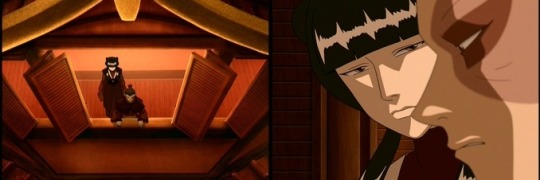
Mai: Zuko, it’s just a dumb meeting. Who cares? Zuko: I don’t. Mai: Well good. You shouldn’t. Why would you even want to go? (Cut to shot of Zuko and Mai standing in the window, the Fire Nation Palace before them. Mai puts her arm around Zuko) Just think about how things went to the last war meeting you went to. Zuko: (sighs)I know.
Zuko has been completely distraught about not being invited to the war meeting. This is a huge deal to him, he wants to be the perfect son to Ozai, and he feels like a disappointment and an oversight. Mai can’t understand why this is a big deal to Zuko, and rather than try to understand, she invalidates it and acts like it’s the stupidest thing in the world to be upset over. On top of that, she throws in his face one of the biggest shames of his life, all for the sake of making him feel bad for caring.
Let’s compare these two scenes to two scenes of Katara and Zuko supporting each other. First, Zuko supporting Katara in ‘The Southern Raiders’
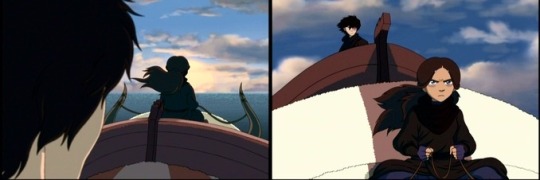
Katara: But, we were too late. When we got there, the man was gone. (voice cracks slightly) And so was she. Zuko: (Cut to a sorrowful Zuko) Your Mother was a brave woman.Katara: (Cut to a front shot of Katara as she touches her necklace) I know.
Katara just opened up to Zuko about one of the most traumatic moments of her life: the murder of her mother. Zuko doesn’t make this about him; he doesn’t talk about the disappearance of his own motheR. He doesn’t try to defend the Fire Nation, his home or tell her not all Fire Nation people. He hears what happened to her, accepts how awful this was for her, and affirms that her mother was a wonderful woman.
Now for Katara supporting Zuko in ‘The Old Masters’:
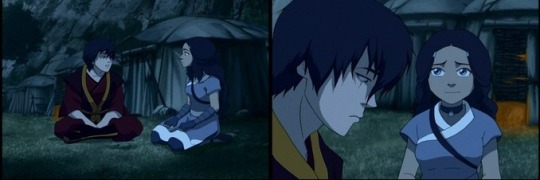
Katara: Are you okay? Zuko: No, (turning his head away from Katara) I’m not okay. My Uncle hates me, I know it. (Katara lowers herself to the ground) He loved me and supported me in every way he could and I still turned against him. How can I even face him? (Cut to a sideview of a regretful Zuko with Katara looking on.)Katara: Zuko, you’re sorry for what you did, right? Zuko: More sorry than I’ve been about anything in my entire life. Katara: (raises her shoulders) Then he’ll forgive you. (Zuko looks at her) He will.
Zuko considers betraying Iroh his greatest regret. Iroh is the father figure Zuko never had growing up, and one of the most important people in his life. Right now Zuko is terrified out of his mind that the only adult figure who has ever loved him and supported him is now done with him forever. He is convinced Iroh will reject Zuko, and he doesn’t even want to face his uncle. Here enters Katara. She sees the regret and fear in Zuko. She knows there isn’t anything to worry about, that it’s ridiculous to think that Iroh wouldn’t forgive him. But Katara doesn’t say any of this. She doesn’t tell him to suck it up, or that he’s being dumb. She allows Zuko to reaffirm his sincerity and then reassures him that everything will be okay.
In these interactions, you can see that even though Zuko and Katara’s personalities are traditionally ‘yang’, when they come together like this, they find a perfect balance. They don’t egg each other on or bring out the worst in each other, they bring out the best, most vulnerable, and their truest selves.
This is what I love about zutara. It isn’t about ‘opposites attract’ or ‘good girl saves bad boy’. It’s about two people with very similar, but ultimately complementary, personalities coming together on equal playing grounds and supporting each other in the most positive way they can because the level of understanding between the two goes beyond words. It’s just natural for them to know exactly what the other needs.
764 notes
·
View notes
Photo
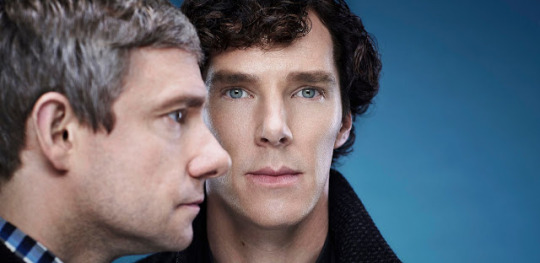
"IT'S ALL FINE" - QUEERBAITING IN BBC'S SHERLOCK... By J. Elizabeth The stage is set. The curtain rises. We are ready to begin. Series four of BBC’s Sherlock, that is. We are only a few weeks away from the promised land. After three years, not including last year’s special "The Abominable Bride," we will finally see our favorite consulting detective back in action. The fandom is certainly in need of some beekeepers because we are abuzz right now. As we celebrate this award winning, international hit show, it’s only fair we talk about its flaws. And there are flaws, let’s not kid ourselves. From how it handles female characters to its lack of people of color, it could be better, despite the best intentions from the showrunners. The flaw I’d like to talk about now is the excessive amounts of queerbaiting. What is queerbaiting? Well, it’s a term used by queer fans of media to call out TV shows/movies/comics/etc that intentionally insert queer subtext or "add homoerotic tension between two characters to attract more liberal and queer viewers with the indication of them not ever getting together for real in the show/book/movie." So how does Sherlock do this? Let’s talk about the obvious "jokes" first. In the very first episode, Sherlock Holmes mistakes John Watson’s questions about his relationship status to be a come on, or that’s how mainstream audiences are supposed to perceive it, anyway. And I laughed when I first saw it four years ago before I realized what it was I was laughing at: the absurdness of a gay relationship between iconic literary characters. John having to defend his "not gay"-ness becomes a running joke that appears in literally every one of the nine episodes. And every time, Sherlock, the man who John himself has stated has to have the last word, never corrects anyone’s assumptions about them. In that very first conversation over dinner where John questions his sexuality, Sherlock says women are not his area and that he doesn’t have a boyfriend. The whole thing is written to keep his sexuality ambiguous. If it were just jokes, that would be one really crappy thing, to poke fun at homosexual relationships in that way. But there are genuinely stark, emotional moments that cannot be a joke, and if they are, that is exceedingly cruel. For example, in the original canon, Irene Adler was Holme’s one exception to his disinterest in women. In the BBC version, Adler is a lesbian dominatrix. She has a conversation with John in which she accuses him of being jealous of Sherlock’s attention on her. John, once again, defends himself by exclaiming “I’m not actually gay.” Irene responds with “Well, I am. But look at us both.” John doesn’t respond to that. Is that a joke? I’d like to note that John repeatedly says he’s not gay. Which he’s probably not but, guess what, gay and straight aren’t the only sexualities. Later on in the series, John flips his lid when he finds a woman, Janine, in 221B after he’s moved out to be with his wife, Mary. This is a very funny moment, because John and I had the same expression at seeing Sherlock kiss a woman. This funny moment gets a little harder to laugh at later on, before John knows it’s a sham, when he sees Sherlock propose to Janine. He looks so happy for him! I can’t get into all the nuanced exchange of looks or phrasing or how they costume Sherlock’s parents the same way Sherlock and John dress (whoops, I guess that one snuck in there), but there are overt references to a perceived relationship by characters within the world. Mrs. Hudson believed them a couple for years, and she is the Queen of the Foreshadow. But I don’t have time to mention how Sherlock pasted John’s head on the body of the Vitruvian man, or how he literally brought himself back to life after being shot by Mary to save John, or how he was reading John’s blog post on how they first met when he O.D.’d on the plane ride to his inevitable death (I did it again, dang). Of course, how we perceive acting or costume choices are objective. The Kuleshov effect proves that. So it makes sense that if a bunch of queer people were watching this show, they’d see parts of themselves in it. And guess what, a lot of queer people are watching this show. Queer women, to be more precise. A show as massively popular as Sherlock attracts a very diverse audience. But if you look at the hardcore fandom, a vast majority are women and/or queer identifying people. What results in all these queer people being attracted (or baited) to this show is a space for them to exist without the social constraints of being out in normal life. What fandom has done for me, personally, has given me a space to think in terms of queerness as if was not something strange about me but the norm in that environment. It rewired my thinking and helped lessen my own heteronormative behavior in my art and life. This space is full of artists and writers who are exercising their craft where they feel safe to do so. This space is full of academics who study media and LGBTQA+ issues within it. And that is a beautiful, amazing thing. So it hurts all the more when the showrunners, Steven Moffat and Mark Gatiss (the latter being a married gay man) dismiss the queer side of the fandom. Sometime after the 2016 San Diego Comic Con, Moffat and Gatiss did an interview that directly addressed the perceived relationship between John and Sherlock. It wasn’t pretty. Moffat, clearly passionate about the topic, and frustrated at the way his words have been twisted, “It is infuriating frankly, to be talking about a serious subject and to have Twitter run around and say oh that means Sherlock is gay. Very explicitly it does not. We are taking a serious subject and trivializing it beyond endurance.” - With an Accent Trivializing it. I wish to express to Moffat that this level of representation of a bisexual character is far from trivial to me. I get a distinct feeling that the creators see the John and Sherlock pairing fans as straight, young girls who want to fetishize male queerness. I can’t help but wonder if the creators would be more accepting and less harsh to fans if we were queer men instead of queer women. Mark Gatiss goes on to say: “Don’t blame us for things that aren’t there. It is infuriating. We get pilloried for these things as if our show [...] has to have the shoulders to bear every single issue and every single campaign point. You can’t do that. It’s our show, they’re our characters, they do what we want them to do, and we don’t have to represent absolutely everything in that ninety minutes.” Gatiss is correct in saying they don’t have to represent absolutely everything. He’s right that they don’t have to bear every issue on their shoulders. I believe that’s what every other show would say as well. But because of that, everybody is saying “We shouldn’t have to be the only ones to tackle these issues,” and nobody is actually doing anything about it. Sherlock has a real opportunity here to have its own chapter in queer media history, but why should they bear that weight on their shoulders, right? Even if they go with the flow and stay safely in the status quo of straight relationships, I’d be able to handle that if they didn’t talk to fans who wish otherwise so harshly. Also, is anyone going to remind them that John Watson and Sherlock Holmes aren’t really their characters? They’re writing and producing high quality fanfiction, but they’re men, so it’s not trivializing when they do it. Moffat says the whole pairing is making a serious topic into “something extremely silly.” My sexuality is not silly. Wanting to see a major television and literary character portrayed with the same sexuality as me is not silly. Maybe they’re right. Maybe everything we see isn’t actually there. Maybe they were all just gay jokes. Maybe we’re the assholes for blowing these jokes out of proportion. Then again, maybe this is some next level form of gaslighting, telling us we’re a bunch of wackadoos for interpreting this little exchange at John’s wedding... as anything but a happy look between best friends at one’s wedding. Look at these guys, totally thrilled about all the life decisions that led them to this point. No pain or regret here. You don’t even have to make it canon, just don’t talk to us like we’re stupid, teenage girls insulting you with our enjoyment of your show. Enjoying it so much, in fact, we are dying to see a part of ourselves validated in that world. And even if this was some elaborate ruse and they really are planning on making this pairing canon, this treatment of the queer and/or female fans isn’t justified. You can't talk down to us like that for the sake of a storyline reveal. It’s much more likely this is just a textbook case of queerbaiting. I hope I’m wrong and Sherlock ends up on the right side of queer media history, but that interview made that hard to believe. Sherlock will end up in queer media history, though. That much is certain, and the fandom can take credit for that. It’s up to The Powers That Be to choose which context it will be discussed in. Regardless, series 4 is coming and no matter what happens, no matter what Moffat and Gatiss say, this is our show too. Not just theirs. Nothing can take away the art we’ve created, the stories we’ve written, or the friendships we’ve made. No matter what happens, your identity is valid. Let this be an inspiration to all you future creators out there, to bear on your shoulders the issues others are afraid to. To challenge the way stories are told. To challenge whose stories get told. Be inspired to do more. To do better. One day, you and I both will be leading the industry, will be the future rulers of media, and... http://www.thefangirlinitiative.com/2016/12/its-all-fine-queerbaiting-in-bbcs.html?m=1#comment-form
13 notes
·
View notes